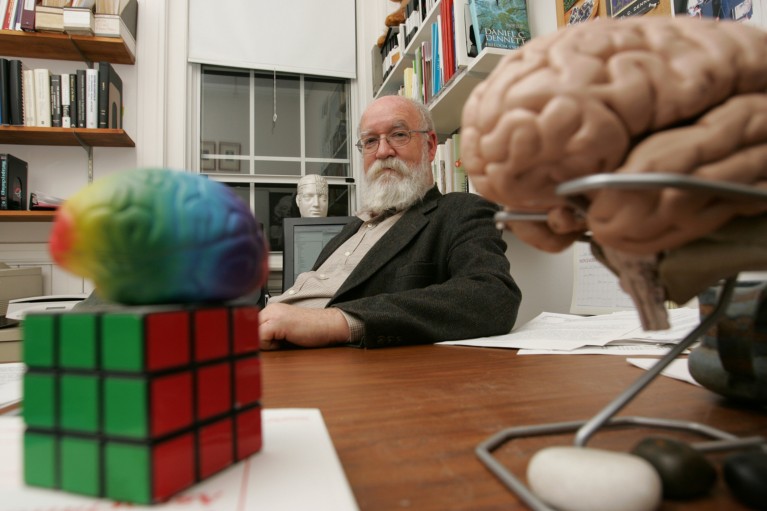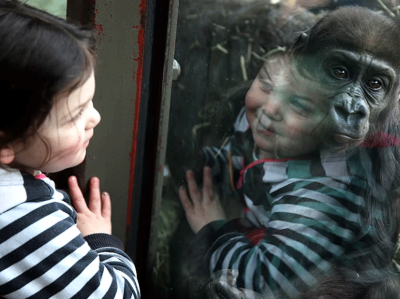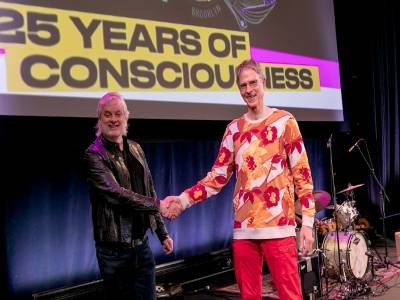
Credit: Rick Friedman/Corbis/Getty
Daniel Dennett, who has died aged 82, was the type of philosopher you couldn’t help but read. His work, directly relevant to biologists, physicists, computer scientists and cognitive psychologists, enticed all curious readers. He expressed bold, sharp views on some of the biggest questions about human existence: what is consciousness, and how is it related to neural activity? Do we have free will? How, if at all, are we different from artificial-intelligence systems? And — a question that famously placed him as one of the ‘four horsemen’ of new atheism, together with Christopher Hitchens, Richard Dawkins and Sam Harris — does God exist?
Dennett’s answers to these questions often prompted great enthusiasm or disagreement — never indifference. From the start of his studies, Dennett was keen on making a difference, and was confident in his ability to do so. As he described in his memoir I’ve Been Thinking (2023), as a first-year student at Wesleyan University in Middletown, Connecticut, he read books by the philosopher Willard Quine, and decided that he should “go to Harvard and confront this man with my corrections to his errors!” He proceeded to do both: transferring to Harvard University in Cambridge, Massachusetts, where he criticized Quine’s account of ordinary language in his honours thesis.
Born in Boston, Massachusetts, in 1942, Dennett spent part of his childhood in Beirut, Lebanon, because his father was a secret agent at the US Office of Strategic Services. In 1947, his father died in a plane crash in Ethiopia, and the family moved back to Boston. After graduating from Harvard, he gained a PhD at the University of Oxford, UK, in 1965, where he explored the concept of intentionality, which would underpin much of his later work. After a six-year spell at the University of California, Irvine, he moved to Tufts University in Medford, Massachusetts, which became his academic home.
Consciousness: what it is, where it comes from — and whether machines can have it
Dennett thought that the best way to polish his ideas was to discuss them with undergraduate students; even two weeks before his death, he held an online class about a paper he was working on. He welcomed opposing views with an open mind, helping his students to think more critically and to refine their arguments, even when they challenged his own views.
One of his main endeavours was to describe the human mind — specifically, consciousness — in a way that is strongly rooted in the third-person perspective, which he called heterophenomenology. He wanted to rely on both scientific evidence and ‘folk psychology’; the typical ways that people understand, interpret and predict the behaviours of others. Applied to consciousness, the third-person perspective implies that people don’t have privileged knowledge about their own conscious experiences.
Dennett wanted to demystify consciousness, and called for data-driven research to study it. This demystification, importantly, involved parting with the concept of ‘qualia’ — the ineffable, first-person aspects of conscious experience, such as the greenness of grass or the sweetness of chocolate.
“The sort of difference that people imagine to be between any machine and any human experiencer … is one I am firmly denying: There is no such difference. There just seems to be,” he wrote in his 1991 book Consciousness Explained. This naturally provoked great criticism and debate.
Some of Dennett’s debates with fellow philosophers and scientists became famous, such as that with Sam Harris about free will. Dennett argued that people have free will because of their ability to deliberate, reason and even reason about reasoning; abilities that Dennett argued developed through evolution. Harris believes that free will is an illusion.
Other debates turned into long-lasting feuds, which he also seemed to enjoy. Dennett emphasized the importance of natural selection in developing adaptive traits. This was one of his main points of contention with biologist Stephan Jay Gould, who advocated for a more plural view of evolution, in which natural selection is only one possible principle by which traits have evolved.
Decades-long bet on consciousness ends — and it’s philosopher 1, neuroscientist 0
According to Dennett, religion arose from a combination of language and humans’ attention to alarming events. Together, they fostered the development of fantasies, or “culturally evolved systems of memes that arose naturally out of our innate vigilance and sociality”, as he said in I’ve Been Thinking. Religion, for him, was the domestication of these fantasies.
Dennett was a champion of knowledge dissemination, translating complicated ideas into clear, sometimes sensational, but always attention-grabbing statements. He delivered thought-provoking, philosophical TED talks and brought the ‘brain in a vat’ thought experiment to the BBC’s audience. A true interdisciplinarian who argued fiercely for breaking the silos of knowledge, he collaborated with computer scientists to create a humanoid robot, with cognitive scientists to better understand the intricacies of perception and with biologists to refine his account of evolution.
Later in life, Dennett continued to seek adventures. He loved to sail his 13-metre sailing boat (named Xanthippe, after Socrates’s wife), sang at glee clubs and played a myriad of instruments.
He also lived by his philosophy. In 2006, after a nine-hour heart surgery, he wrote an essay called ‘Thank Goodness!’, explaining that he was grateful to the staff who cared for him, the scientists who developed the medicine to allow the doctors to treat him and even the peer reviewers and journal editors that published the work of those scientists — rather than to God. For him, it was the goodness of the knowledge generators and truth-seekers throughout history that should be thanked. It is only fitting that Dennett himself be included in this list.

 Consciousness: what it is, where it comes from — and whether machines can have it
Consciousness: what it is, where it comes from — and whether machines can have it
 Decades-long bet on consciousness ends — and it’s philosopher 1, neuroscientist 0
Decades-long bet on consciousness ends — and it’s philosopher 1, neuroscientist 0
 If AI becomes conscious: here’s how researchers will know
If AI becomes conscious: here’s how researchers will know
 Can lab-grown brains become conscious?
Can lab-grown brains become conscious?
 Sex and gender in science
Sex and gender in science






